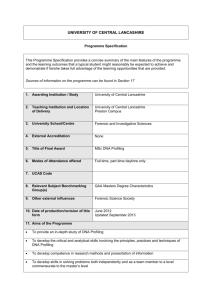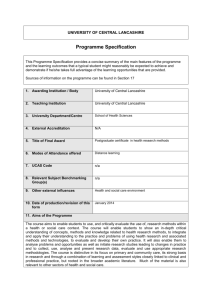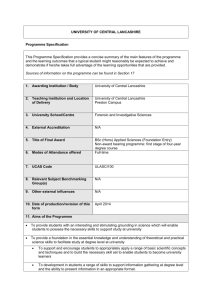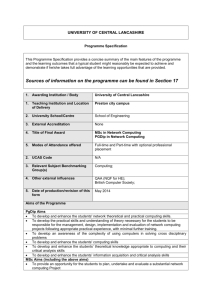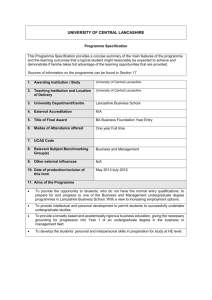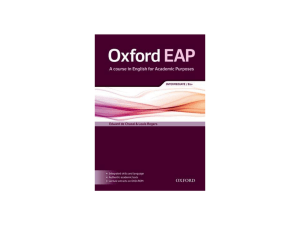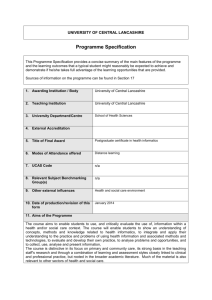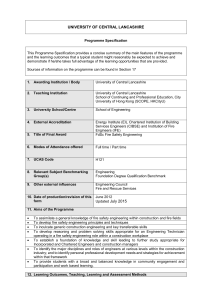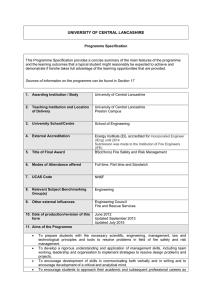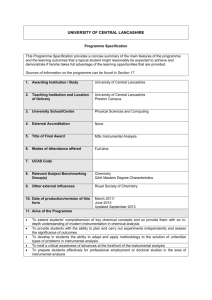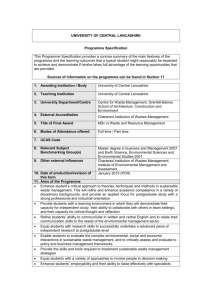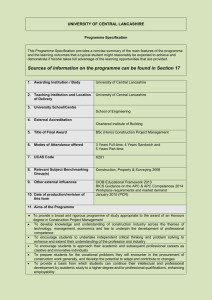msc_document_analysis - University of Central Lancashire
advertisement
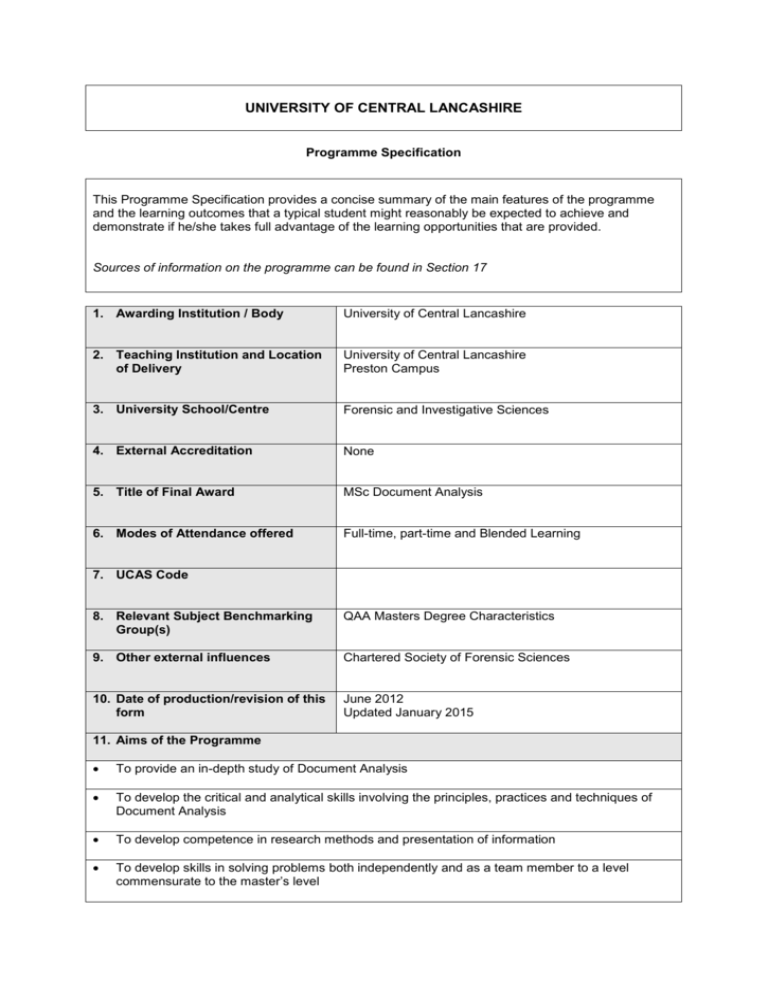
UNIVERSITY OF CENTRAL LANCASHIRE Programme Specification This Programme Specification provides a concise summary of the main features of the programme and the learning outcomes that a typical student might reasonably be expected to achieve and demonstrate if he/she takes full advantage of the learning opportunities that are provided. Sources of information on the programme can be found in Section 17 1. Awarding Institution / Body University of Central Lancashire 2. Teaching Institution and Location of Delivery University of Central Lancashire Preston Campus 3. University School/Centre Forensic and Investigative Sciences 4. External Accreditation None 5. Title of Final Award MSc Document Analysis 6. Modes of Attendance offered Full-time, part-time and Blended Learning 7. UCAS Code 8. Relevant Subject Benchmarking Group(s) QAA Masters Degree Characteristics 9. Other external influences Chartered Society of Forensic Sciences 10. Date of production/revision of this form June 2012 Updated January 2015 11. Aims of the Programme To provide an in-depth study of Document Analysis To develop the critical and analytical skills involving the principles, practices and techniques of Document Analysis To develop competence in research methods and presentation of information To develop skills in solving problems both independently and as a team member to a level commensurate to the master’s level 12. Learning Outcomes, Teaching, Learning and Assessment Methods A. Knowledge and Understanding A1. Analyse a complex problem involving the specific aspects of Document Analysis and be able to design and implement a suitable solution. A2. Present forensic information and be aware of the role of the expert witness. A3. Apply data handling skills, effectively plan a project and use documentation skills in an appropriate manner. A4. Design, plan and implement solutions to complex problems in Document Analysis and be capable of analysing the effectiveness of such solutions. A5. Develop and write a research project within guidelines and be able to assess the success of such a project. A6. Apply the skills developed on the course to a relevant individual project. A7. Synthesise solutions to problems involving several aspects of Document Analysis either independently and/or as a team member. Teaching and Learning Methods Lectures, seminars, laboratory demonstrations, directed reading, group and individual projects and presentations. Assessment methods Preparation of case notes, essays, reports, group and individual presentations and end of module exam or viva B. B1. B2. B3. B4. B5. Subject-specific skills Implement Document Analysis solutions to complex problems. Effectively communicate Document Analysis solutions with both experts and non-experts. Research information from literature/manuals/internet. Critically evaluate different potential solutions to a problem. Identify gaps in current knowledge Teaching and Learning Methods Lectures, seminars, laboratory demonstrations, directed reading, group and individual projects and presentations. Assessment methods Preparation of case notes, moot court exercises, practical reports, and group and individual presentations. C. Thinking Skills C1. Critically evaluate technical and non-technical information C2. Plan and conduct a practical research project. C3. Communicate results and ideas to both experts and non-experts C4. Assimilate ideas quickly. Teaching and Learning Methods Skills developed through lectures, data interpretation, case studies, practical work, research projects, presentations, problem solving. Assessment methods Preparation of case notes, essays, reports, group and individual presentations and M-level dissertation. D. Other skills relevant to employability and personal development D1. Time management skills D2. Work in a team. D3. Work independently under minimum supervision. D4. Generate original ideas. D5. Synthesise knowledge. D6. Presentation Skills Teaching and Learning Methods Skills developed through lectures, data interpretation, case studies, practical work, research projects, presentations, problem solving. Assessment methods Preparation of case notes, essays, reports, group and individual presentations. 13. Programme Structures* Level Level 7 Module Code FZ4001 FZ4002 FZ4003 FZ4004 FZ4101 FZ4102 FZ4103 Module Title Research Methods The Expert Witness in the Legal Process Research Project Laboratory Management and Quality Assurance Handwriting Analysis and Signature Comparisons Typescript and Printing Methods Document Investigation 14. Awards and Credits* Credit rating 20 20 60 20 30 10 20 Masters Degree in Document Analysis Requires 180 credits at Level 7 MSc with Distinction APM and Research Project 70% MSc with Merit APM and Research Project 60% Postgraduate Diploma in Document Analysis Requires 120 credits at Level 7 Postgraduate Certificate in Document Analysis Requires 60 credits at Level 7 (cannot be FZ4003 Research Project) 15. Personal Development Planning PDP is delivered and monitored through project modules and the personal tutor system. Students are provided with a PDP handbook and an introductory lecture on it during induction week. 16. Admissions criteria Programme Specifications include minimum entry requirements, including academic qualifications, together with appropriate experience and skills required for entry to study. These criteria may be expressed as a range rather than a specific grade. Amendments to entry requirements may have been made after these documents were published and you should consult the University’s website for the most up to date information. Students will be informed of their personal minimum entry criteria in their offer letter. Applicants will normally be required to have: 2:2 UK degree or equivalent in appropriate discipline (Forensic Science, Chemistry, Analytical Chemistry, Law). Applicants will be required to have a minimum level of proficiency in English Language equivalent to IELTS grade 6.5. Please consult the UCLAN admissions department for the most up to date requirements. Blended learning students are required to attend the university for an intensive 12 day period during semester 2 to cover the laboratory aspects of the course and practical assessments. 17. Key sources of information about the programme University website (www.uclan.ac.uk) School website (www.uclan.ac.uk/forensic) Course Leader 18. Curriculum Skills Map Please tick in the relevant boxes where individual Programme Learning Outcomes are being assessed Level Module Module Title Code Core (C), Compulso ry (COMP) or Option (O) Knowledge and understanding A1 LEVEL 7 A3 A4 Research Methods COMP FZ4002 The Expert Witness in the Legal Process Research Project COMP C Laboratory Management and Quality Assurance Handwriting Analysis and Signature Comparisons Typescript and Printing Methods Document Investigation COMP FZ4004 FZ4101 FZ4102 FZ4103 A5 A6 A7 B1 B2 B3 B4 FZ4001 FZ4003 Note: A2 Programme Learning Outcomes Subject-specific Skills Thinking Skills B5 C1 C2 C3 C4 Other skills relevant to employability and personal development D1 D2 D3 D5 D6 COMP COMP COMP Mapping to other external frameworks, e.g. professional/statutory bodies, will be included within Student Course Handbooks D4
